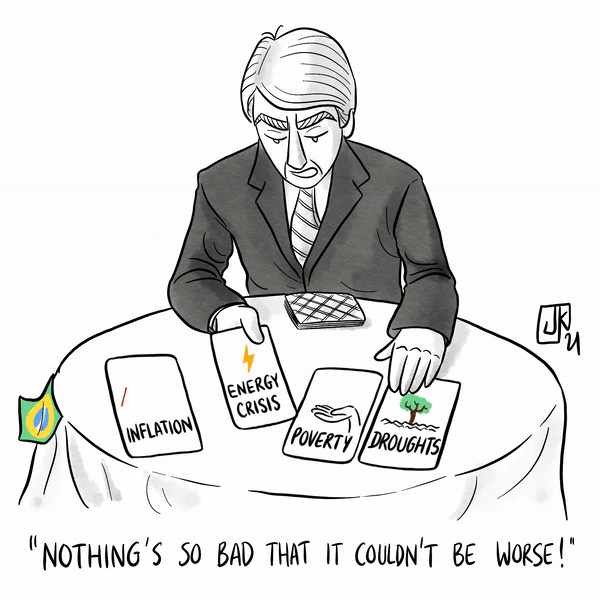“Nothing’s so bad that it couldn’t be worse.” When Brazil’s far-right President Jair Bolsonaro uttered this famous saying this week to describe his country’s current milieu of high prices, low growth, and general pessimism. While perhaps intended as a light-hearted and somewhat uplifting quip, it felt a lot more like a threat.
Exempting himself from responsibility once again, Mr. Bolsonaro argued that, if it were up to him, the Brazilian currency would not be so devalued, nor gasoline prices so high, and inflation would be under control. While there are technical arguments to back his view, passing the buck — on this occasion, to the judiciary, Congress, and state governors — has little practical effect, especially when there is a lot the federal administration could have done to prevent Brazil’s economic mess.
The perfect storm raging around the country did not arrive by chance, and the signs have been there for those willing to see them. Back in December, the Central Bank projected inflation would see a peak around the third quarter of this year, as the economy reopened and the country’s hydroelectric reservoirs would be placed under extreme strain.
This year’s rainy season was one of the driest on record, allowing the government to put the ongoing energy crisis down to bad luck. But, in fact, such a dry spell could have been reasonably predicted, considering changing weather patterns in southeastern Brazil that date back at least until 2014. At the end of last year, crisis was already on the cards. During the underwhelming rainy season, Brazil increased the quantity of electricity it imports from Argentina, a clear sign that domestic production wasn’t able to meet demand.
And experts warn that extreme weather is linked to deforestation in the Amazon, as the rainforest is responsible for providing humidity to Brazil’s interior. When analyzing the Bolsonaro government’s environmental record, we see that the administration has done little to curb illegal logging and forest clearing, and in fact is actively contributing to the destruction process by cutting the budgets of environmental agencies.
Regarding more technical-economic aspects, the Central Bank has also been warning that balancing public accounts is key for keeping interest rates for years now. Instead of working to manage it, the Bolsonaro administration let the IOU bonds situation stay out of control, while the president was too busy attacking the judiciary while his economic advisors were creating new taxes to afford aid programs with electoral goals.
Together, all these announced tragedies have been weaving a dreadful fate for Brazilians. With prices high and incomes low, large parts of the population are already feeling the desperation.
So, Mr. President, how much worse can it get?


 Search
Search






































